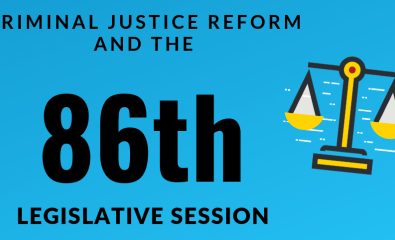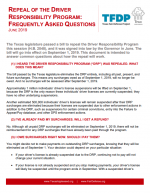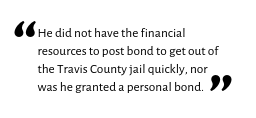
What Went Right with Criminal Justice Reform in the 86th Session
The 86th Texas legislative session was a disappointing one for progress on criminal justice reform. Issues that Texas Appleseed had prioritized going into session failed to pass. Comprehensive bail reform was derailed by the introduction of a weaker bill with the Governor’s backing. A bill to reduce driver’s license suspensions for unpaid fines didn’t even get a hearing; the private vendor that administers the suspension program aggressively lobbied against any changes, eager to protect their bottom line.Other commonsense bills that we supported also failed, including the Sandra Bland Act which would have limited arrests for fine-only offenses. The bill failed, only to be resurrected and fail again.
Still, it wasn’t all bad, and several of our priority bills were passed by the Texas Legislature. These bills will help Texans struggling to pay fines and fees that they owe and reduce the number of driver’s license suspensions on account of unpaid fines and fees.
Most significantly, the Legislature repealed the Driver Responsibility Program, which assesses additional fees called surcharges on people convicted of certain traffic-related offenses. The hefty surcharges were impossible for many to pay, and when they didn’t pay, their licenses were automatically suspended. While the DRP was almost universally reviled, legislation to repeal the program also needed to replace the revenue the DRP had generated to fund trauma hospitals in order to pass, which Representative John Zerwas and Senator Joan Huffman were able to do with H.B. 2048.

On September 1, 2019, the DRP will cease to exist. Any unpaid surcharges, totalling about $2.5 billion, will be erased, and no more surcharges will be assessed in the future. All existing DRP suspensions will be lifted. Based on the data Texas Appleseed has received, about 1 million people whose licenses are suspended on account of the DRP have no other types of suspensions and will be eligible to renew their driver’s licenses immediately — although about 350,000 have reinstatement fees for other convictions that they’ll have to pay before doing so. Another 500,000 people will have their DRP suspensions lifted on September 1, but still have other enforcement actions that prevent them from driving legally. Texas Appleseed and the Texas Fair Defense Project provide answers toFrequently Asked Questionsabout the DRP repeal in this document. Any other case-specific questions can be sent to a special email address that DPS has established to handle repeal-related inquiries: DRPRepeal@dps.texas.gov.
In addition, the Legislature limited the length of administrative license suspensions by DPS with the passage of HB 162 (Rep. James White). These “double ding” suspensions result when DPS has evidence that someone who had a suspended license had been driving during the suspension period. Given that the majority of license suspensions in Texas are due to unpaid fines and fees — not dangerous driving — these suspensions mostly serve to extend the period of time that low-income Texans are penalized for not being able to pay their fines and costs.
Finally, most of SB 1637, an excellent bill by Senator Judith Zaffirini, was amended onto another bill, SB 346. Rep. James White also filed a House version of SB 1637: HB 465. This bill will allow courts to retain jurisdiction over criminal cases in order to modify fines and fees even after a person has been convicted and sentenced, and will give people a right to a post-conviction hearing on their inability to pay fines and fees in any criminal case. The judge can then make adjustments to help people resolve what they owe, including converting their fines to community service and/or waiving or reducing what they owe to an amount they are able to pay. The bill also outlines factors judges can consider when deciding whether community service would cause an undue hardship on someone, which will hopefully make judges more comfortable with waiving fines and costs. Finally, the bill ensures that someone who appears in justice or municipal courts to resolve Class C fines and fees will not be arrested on warrants issued in Class C cases. Ensuring that courts are a safe haven will give people the assurances they need to come to court and resolve what they owe.

Even while reflecting on the successes this session, we feel the urgent need for further reform to help people trapped by a criminal justice system that punishes people more harshly on account of their poverty. Earlier this week, I court watched a misdemeanor court in Travis County and saw a prime example. A young Black man had been driving his friend’s car when he got in a minor accident. He waited for the police to arrive at the scene, no idea of the injustices about to happen. When police arrived, they learned he had a couple of unpaid traffic tickets and informed him he would be arrested. The police searched the car as part of the arrest and found brass knuckles, which were in his friend’s backpack in his friend’s car, and charged him with possession of an illegal weapon, a Class A misdemeanor.

He did not have the financial resources to post bond to get out of the Travis County jail quickly, nor was he granted a personal bond. So, by day two, (when I was watching court), he was anxious to get out of jail and go home. He explained what had happened to the judge, expressing his hesitation to plead guilty or no contest since he did not even know about the brass knuckles. But, ultimately, he pled no contest so that he could be sentenced to time served and released that same day. He now has a Class A misdemeanor criminal conviction on his record for an offense that will likely have future employers hesitating to hire him. Notably, Governor Abbott just signed into law a bill passed this session making possession of brass knuckles legal, but the law doesn’t take effect until September 1. Had all of this happened a few months from now, the man could not have even been charged with this misdemeanor.
This man was clearly indigent, as he qualified to have counsel appointed to him. Had there been a better way to resolve his traffic tickets despite his lack of income, he would not have been arrested. Had he been quickly released on personal bond for his misdemeanor charge, he may not have felt the pressure to accept a plea bargain. He would have been free to pursue his constitutional right to a trial and might have been acquitted, avoiding a criminal conviction that will pose barriers to success for years to come.
We’ll keep fighting for people like this young man. We’ll return with renewed energy and focus to our legislative priorities that died, like bail reform and reforming driver’s license suspensions for unpaid fines. Encouraged by the progress made this session, we look forward to building upon it in 2021.